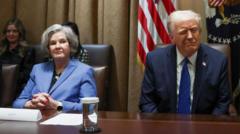This decision will likely reshape the landscape of U.S. trade policy after a significant push against the Trump administration's tariffs has gained traction.
US Trade Court Strikes Down Trump's Extensive Tariffs

US Trade Court Strikes Down Trump's Extensive Tariffs
A federal ruling challenges the basis of President Trump's trade policies, asserting that Congress alone holds the power to regulate commerce.
In a landmark decision, a U.S. federal court has overturned President Donald Trump’s extensive tariff regime, marking a significant setback for his economic strategy. The Court of International Trade determined that the emergency authority invoked by the White House does not permit Trump to unilaterally impose tariffs across the board on numerous nations.
The Manhattan-based court emphasized that the U.S. Constitution grants Congress sole authority to manage international trade, which cannot be overshadowed by the president's role in economic protection. Following the ruling, the Trump administration swiftly filed an appeal.
In addition to blocking the overarching tariffs, the court also nullified specific levies imposed by Trump on China, Mexico, and Canada, which were enacted as a response to what was termed an unacceptable influx of drugs and illegal immigration into the U.S. White House deputy press secretary, Kush Desai, released a statement asserting that “it is not for unelected judges to dictate how to effectively manage a national emergency.” He reaffirmed Trump’s commitment to prioritize American interests.
The legal challenge was initiated by the Liberty Justice Center, advocating for five small businesses impacted by the tariffs, representing the first major challenge to Trump's so-called "Liberation Day" tariffs. New York Attorney General, Letitia James, who is part of the coalition of 12 states engaged in the litigation, applauded the ruling, claiming that no president holds the unilateral power to impose taxes at will.
James further warned that the tariffs would constitute a substantial tax increase on American families and businesses, promoting inflation and risking job losses nationwide. Alongside this case, the Trump administration faces several ongoing legal battles regarding its trade policies, with the current ruling highlighting the court's interpretation of the International Emergency Economic Powers Act (IEEPA) from 1977.
The court's three-judge panel concluded that the tariffs exceeded the authority granted to the president under this act. Market reactions to the announcement were positive, with significant rises in Asian stock markets and futures for U.S. stocks indicated a bullish outlook for traders. These developments suggest a potential revamping of U.S. trade policy following the court's decision.




















